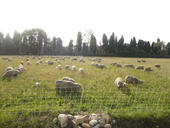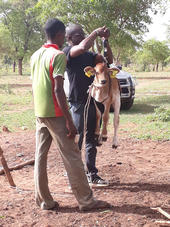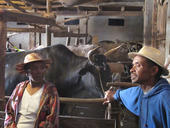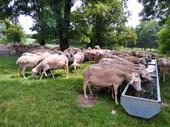Alternative management of livestock agroecosystems (ALTER)
Lines of Research
Last update: 6 July 2022
Analysis of practices: diagnosis, typology and understanding of processes
The analysis of livestock farming practices lies at the core of almost all of the work conducted in ALTER because it is an ideal entry point for understanding the ways in which farmers conduct themselves in relation to their natural and professional environment.
Our research on practices is conducted at several scales, such as: 1) the livestock unit (studying the modalities, performances and determinants of the practices implemented in the unit); 2) the farm and the household (studying the practices and trade-offs between units); 3) the territory and the value chain (studying the marketing, use and management of pastoral resources). We also pay particular attention to the study of local know-how and atypical practices, because these are possible sources of innovation.
The analysis of practices leads mainly to two types of outputs: typologies to characterize the diversity of livestock systems and trajectories to characterize their change dynamics. This provides input for our work on modelling, evaluation and design.
Modelling livestock systems: modelling management methods, performance and positive and negative impacts of livestock activities
ALTER uses modelling extensively to explain and understand the processes that have led to current situations and to predict, test new scenarios, and even redesign livestock systems. To meet these objectives, a wide range of models is used, from conceptual models to spatialized computer simulators.
ALTER's models are unique in their ability to take into account different levels of organization. The notion of spatial scale is therefore often addressed (GAMA and OCELET modelling tools) and relies on in-house expertise, but also collaborations with geographers and computer scientists.
When models aim to compare the impact of implementing different scenarios, assessment methods range from the most basic (i.e., comparing model outputs corresponding to indicators) to the most elaborate (i.e., Ecological Network Analysis, SNA, LCA).
Co-design of innovative livestock systems and management methods: from hunting down innovations to the participatory implementation of innovative management methods and livestock systems
The economic, environmental and social challenges facing Mediterranean and tropical livestock systems require research to understand the processes of change at work, but also to support these changes. Our work on the design of innovative livestock systems aims to do just that.
This involves designing alternative, economically viable, environmentally reproducible and socially acceptable livestock production systems with livestock system stakeholders and actors in their environment, using the methodological frameworks for designing innovative agricultural systems (de novo design and step-by-step design, etc.) and participatory modelling tools.
Involving local stakeholders in the design process produces desired and sustainable changes, which is why participatory approaches and taking into account local knowledge are at the core of our intervention methods. The co-design process is based on an iterative approach with three main steps: 1) diagnosis; 2) full-scale experimentation in situ or by simulation of innovative management modes; 3) assessment.
Multi-criteria assessment of livestock systems’ performance and impacts
The practices implemented by livestock farmers, and their evolution in a changing context, have impacts at different levels of organisation, whether on the scale of the areas they use (evolution of spontaneous grazed vegetation, evolution of landscapes, etc.) or more globally (water resources, climate, etc.). Assessing these impacts is one of ALTER’s objectives. This approach can be carried out in conjunction with the evaluation of the performance of systems implementing these new practices in order to better meet the challenges of Mediterranean and tropical livestock systems. In both cases, we use a multi-scale (in space and time) and multi-criteria assessment approach. The objective of this line of research is to produce ex-post or ex-ante assessments of the performance and positive or negative impacts of livestock systems, at the scale of a farm, but also at the scale of a diversified set of livestock farms in a territory.
Three approaches to the construction of evaluation methods can be identified in the research undertaken by ALTER agents: i) modelling, which allows for an integrative approach to the system studied, followed by scenario testing with a view to forecasting; (ii) quantitative or semi-quantitative methods, which are based on the calculation of different variables before and after change; and (iii) qualitative methods, which allow for the analysis of expert data. It should be noted that most frequently several methods are used in order to obtain a comprehensive understanding of the impact or performance studied.
The use of conceptual frameworks to analyze livestock practices and systems and multi-criteria assessment methods are required in ALTER’s work, as is their adaptation in order to better target the relevant indicators capable of valorising the specificities of agro-pastoral livestock systems.
Last update: 6 July 2022



